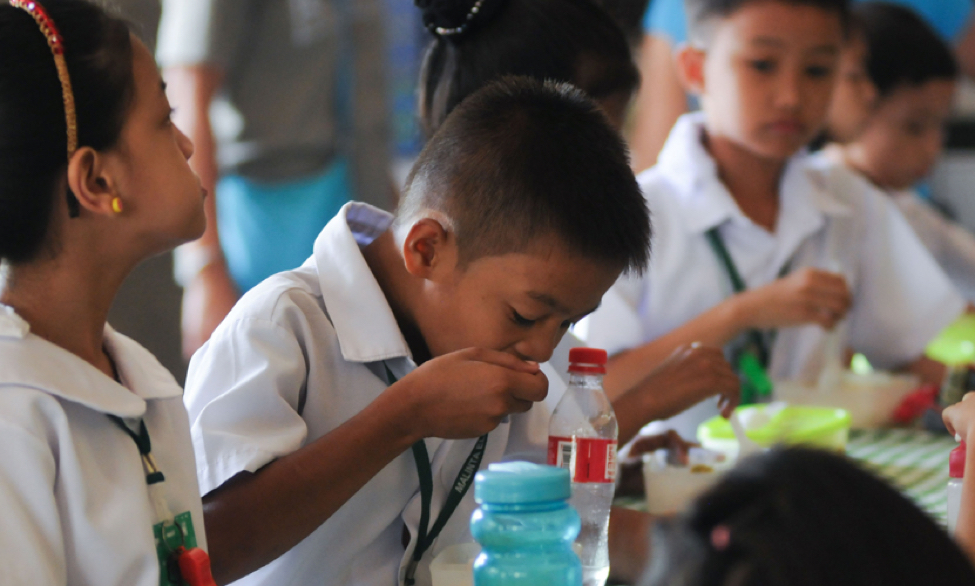
Valenzuela City’s “K to 6 In-School Feeding Program” has substantially improved the health condition of nine out of 10 beneficiaries in all 39 public elementary schools for the school year 2014-2015, based on a report of an Ateneo-based institution.
In a report of Ateneo Center for Educational Development (ACED), it showed that 6,442 (90.5 percent) of 7,116 students under the city-wide feeding program had shown significant improvement in terms of their body mass index (BMI).
Students previously classified under “severely wasted” and “wasted” nutritional status when weighted during their enrollment have become ‘normal’ in terms of their BMI after the feeding program, which ran from June 2014 to March 2015.
Related News: What is ‘Nutri-Skwela Act’?
Severely wasted and wasted refer to those who are very thin for their height and are typically suffering from acute malnutrition, according to the United Nations Children’s Fund (UNICEF).
Meanwhile, normal are those who have healthy-level of fat and muscle distribution in accordance to their height and age.
Out of 39 public elementary schools, nine also achieved 100 percent full improvement of their students in the program, namely:
- Bitik Elementary School
- Constantino Elementary School
- Andres Mariano Elementary School
- Apolonia F. Rafael Elementary School
- Gen T. De Leon Elementary School
- Paso De Blas Elementary School
- Santiago Elementary School
- Fernando Elementary School
- Tugatog Elementary School
“K to 6 In-school Feeding Program” is the first major city-wide feeding program in the Philippines which started in 2012 during the mayoral term of incumbent Valenzuela City Congressman Win Gatchalian.
A cycle of 25 recipe set was used in the feeding program for school year 2014-2015 to ensure that students would not get tired of the meals given to them.
Related News: ‘NutriSkwela Act of 2015’ to curb malnutrition of 20% PH children
Food recipes in the program were adopted from the standardized recipe book of Health Nutrition Council (HNC) of the Department of Education (DepEd).
To elevate the benefits of feeding program nationwide, Gatchalian recently filed House Bill No. 5348 or the “Nutri-Skwela Act of 2015” to ensure that at least one meal on each school day of the academic year is provided to all children enrolled in day care, kindergarten and grades 1 to 6 in all public educational institutions across the country.
He further said that children whose daily academic program lasts for more than five hours should be eligible for two meals free of charge.
Gatchalian said based on the 2013 National Nutrition Survey (NNS), 8.6 percent of school-aged children between 5 and 19 years old are wasted, indicating that they suffer from acute malnutrition.
He cited the findings of the DepEd which said that for the 2012-2013 academic year, 1,918,464 public school children were wasted or severely wasted.
Related News: Over 15k students in Valenzuela City to benefit from feeding program
“These statistics show that we, as a nation, have failed to satisfy the adequate nutritional needs of today’s children,” said Gatchalian, who is a member of House Committee on Basic Education and Culture.
“The basic right of a child to proper care and nutrition as provided for under our Constitution had largely gone ignored in the case of at least one million school children,” he added.
One of the provisions of the “Nutri-Skwela Act” is the expansion of National Nutrition Council, which shall be responsible for the overall formation, implementation, and evaluation of the program.
A key element of the program is to empower local government units to actively participate in the program through the City and Municipal Nutrition Committees, otherwise known as Local Committees, which shall be mainly responsible for the procurement of food, and logistical and organizational concerns of the program. (Tim Alcatara)


